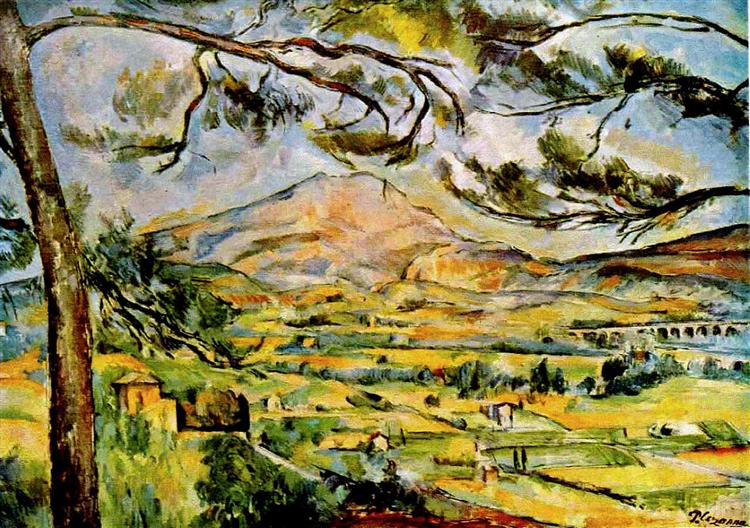Kuvaus
Vuonna 1887 toteutettu Paul Cézannen "Mont Sainte-Victoire" -teos on todistus sekä hänen teknisestä mestaruudestaan että hänen innovatiivisesta taiteellisesta lähestymistavasta, joka loi perustan nykyaikaisen taiteen kehitykselle. Tämä maalaus, joka kuvaa paljastettua maisemaa, jonka Cézanne tunsi ja arvostettiin syvästi, on yksi monista esityksistä, jotka taiteilija teki tästä valtavasta vuoresta.
Tässä työssä koostumus on rakennettu harmoniseen tasapainoon, joka heijastaa orgaanista suhdetta, jota Cézanne viljelee ympäristöönsä. Kankaan keskellä edustettua vuoria on majesteettinen, melkein kuin kuvake, ja sitä ympäröi maisema, joka paljastuu useissa kerroksissa, mikä osoittaa sen kyvyn luoda syvyyttä ja näkökulmaa värin ja muodon kautta. Cézanne käyttää melkein geometristä lähestymistapaa muodon rakentamisessa, luonnostelemalla pystysuoraa ja vaakatasoa tarkkuudella, joka korostaa sen taustalla luonnon esittämisessä. Tien ja kalliomuodostelmien diagonaalit ohjaavat katsojaa kohti vuoristotausta, luomalla dynaamisen liikkeen tunteen.
Värin käyttö "Mont Sainte-Victoiressa" on erityisen merkittävä. Cézanne käyttää palettia, joka kattaa useita sävyjä, sekoittaen ocheria, sinistä ja vihreää hienolla hienovaraisuudella. Tämä lajike ei vain anna elämää vuorelle ja sen ympäristölle, vaan myös välittää auringonvaloa, joka vaikuttaa maisemaan. Värien käyttö, jota levitetään lyhyinä ja päällekkäisissä harjakokeissa, saavuttaa elinvoimaisen tekstuaalisuuden, joka kutsuu mietiskelyä. Näiden siveltimien kautta Cézanne onnistuu vangitsemaan valon ja varjojen asteet, mikä viittaa ympäristöön jatkuvassa muutoksessa menettämättä sen koostumuksen rakenteellista voimaa.
Mielenkiintoinen osa teoksia on ihmishahmojen puuttuminen, jota Cézanne usein tutki seuraavissa teoksissa. Tässä huomio keskittyy yksinomaan maisemaan, mikä viittaa haluun herättää intiimi ja melkein henkinen yhteys itse luontoon. Tämän valinnan kautta Cézanne kutsuu meitä absorboimaan koko maisemaa sen sijaan, että häiritsemme itseämme ihmisen läsnäoloon; Hänen herkkyydestään luontoa kohtaan tulee tämän maalauksen päähenkilö.
Samankaltaiset Cézannen maalaukset paljastavat hänen pakkomielle vuorestaan, joka esiintyy toistuvasti hänen työssään, korostaen hänen omistautumistaan saman esineen valon ja ilmaston muunnelmien tutkimiseksi. Tämä toisto ei ole vain pelkkä harjoitus, vaan syvä pohdinta itse käsityksestä ja meidän ympäröivän todellisuuden luonteesta. Cézanne, tyylillä, joka hämärtää viivan hahmon ja taustan välillä, esittelee suuntauksia, jotka vaikuttavat myöhempiin liikkeisiin, kuten fauvismiin ja kubismiin.
Vuoden 1887 "Mont Sainte-Victoire" ei ole vain tietyn hetken mestariteos Cézannen taiteellisessa evoluutiossa, vaan myös taidehistorian perustavanlaatuinen kappale, joka merkitsee katkeraa makeaa ja ylenmääräistä nykyaikaisuuden prosessia. Kun sitä pohditaan, olemme todistajia paitsi Provencal -maisemasta, myös uuden tapaa nähdä ja ymmärtää maailmaa, taiteellisen aikomuksen ja luonnon ylevän kauneuden välissä.
KUADROS ©, kuuluisa maali seinällesi.
Käsivalmistetut öljymaalaukset, ammattitaiteilijoiden laadun ja erottuvan sinetin kanssa KUADROS ©.
Kuvien jäljennöspalvelu tyytyväisyystakuu. Jos et ole täysin tyytyväinen maalauksen jäljennökseen, palautamme rahasi 100%.

